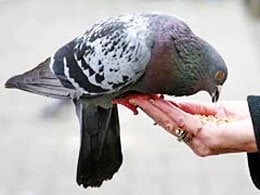
Say NO to Bird Poison
- by: Vashi Chandi
- recipient: Animals, Environmental & Human Welfare Organizations
Poisoning the birds is NOT the answer and NEVER the solution please.
_____________________________________________________________
http://www.youtube.com/watch?v=aumnCQ-B6_Q
__________________________________________________________________
http://www.peta.org/issues/wildlife/cruel-wildlife-control/bird-poisons/

Companies often tell potential customers that Avitrol and other avicides are “flock-dispersing agents” that “scare” birds away from areas where they are not wanted. They’ll even tell customers that these products are humane. Nothing could be further from the truth.
Avicides like Avitrol are acutely toxic and cause birds and other animals to suffer immensely. Avitrol attacks and impairs birds’ nervous systems, causing birds who ingest the poison to become disoriented, exhibit erratic flight and tremors, and suffer violent convulsions for hours before they finally succumb to the effects of the toxin.
If you find a bird who is suffering from convulsions or showing other signs of poisoning, transport the animal to a veterinarian immediately. If he or she determines that the bird has been poisoned, notify your local animal control agency immediately so that it can investigate.
Also, all birds and their nests, with the exception of pigeons, starlings, grackles, and English house sparrows, are protected under the federal Migratory Bird Treaty Act (MBTA). If you or anyone you know has witnessed someone intentionally or unintentionally poisoning or harming protected birds, please contact your local U.S. Fish and Wildlife Service Special Law Enforcement agents immediately so that they can initiate an investigation and charge those responsible with MBTA violations.
________________________________________________________________
http://www.humanesociety.org/animals/resources/facts/avitrol.html
There are numerous proven humane methods to resolve conflicts with “nuisance” birds such as pigeons, ranging from a new “hatch control” contraceptive drug (OvoControl-P), which limits bird reproduction, to ways to make sites where birds congregate unwelcoming.
What you can do to help
If you think you’ve found poisoned birds, be aware that groups of birds can die from diseases. If the birds are mainly pigeons, house sparrows, European starlings, or blackbirds in a developed area, Avitrol® poisoning may be a strong possibility. Tell-tale signs include erratic flight, tremors, and convulsions. Avitrol® is typically administered on corn kernels or pieces, so corn in the affected birds’ mouths or scattered in the area is common when birds are poisoned.
- Try to help any surviving birds by immediately contacting your local animal control agency, a wildlife rehabilitator, or a veterinarian.
- Dead birds and scattered bait should not be allowed to remain in the open where raptors and scavengers, including neighborhood dogs and cats, can be poisoned.
- Contact local animal control about this if the property owner or manager is not removing these hazards immediately.
- If you believe you have found a federally protected species poisoned, contact your regional USFWS enforcement office.
______________________________________________________________________
By signing, you accept Care2's Terms of Service.
You can unsub at any time here.
Having problems signing this? Let us know.